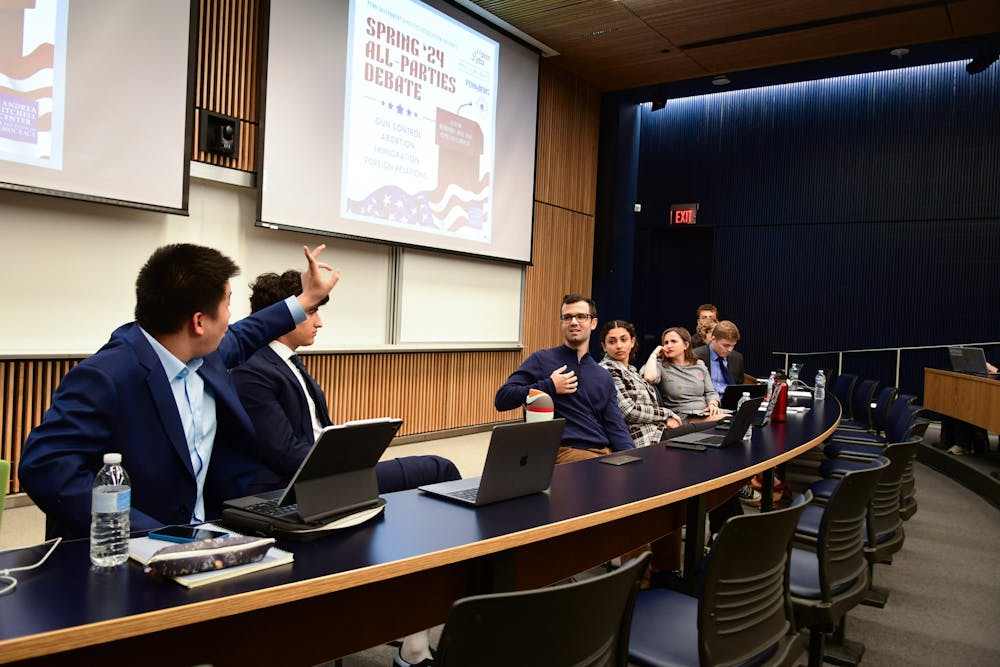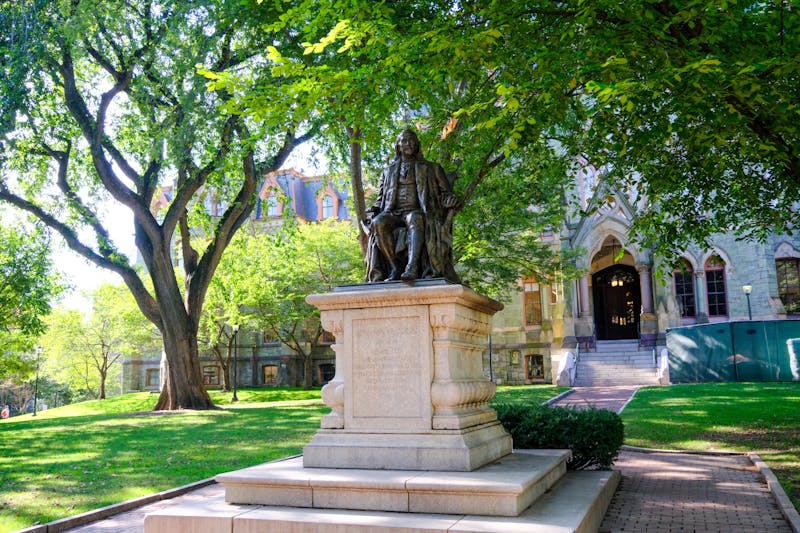
The Penn Government and Politics Association hosted a New Student Orientation preceptorial debate between Penn Democrats and Penn College Republicans.
The Aug. 24 debate centered on whether Vice President Kamala Harris or former President and 1968 Wharton graduate Donald Trump is the best choice for the presidency. Penn Dems was represented by College junior and Penn Dems President Ellie Goluboff-Schragger, College junior Selma Farsakh-Ulm, and College junior Declan Brady. College sophomore William Pallan and Wharton sophomore Finn Broder debated on behalf of College Republicans.
The debate was moderated in four sections: the economy, foreign policy, immigration, and abortion.
Penn Dems and College Republicans began by introducing their clubs to the approximately 60 first years attending the event, and explained their goals for the year were to work to ensure their respective parties’ candidates for president are elected.
Following both sides' opening statements, the debate began with a discussion of Trump's and Biden’s economic policies. Farsakh-Ulm said that Trump has made the United States more dependent on other countries for its energy supply, while Pallan cited Trump’s Keystone XL oil sands pipeline “that created 11,000 union jobs for hardworking Americans.”
Pallan also claimed that the Democratic Party folded on its democratic morals, calling it "the least democratic institution."
“Just a few months before the election, [the Democratic Party] subverted the will of [its] own voters and installed a nominee who received zero votes for president,” Pallan said, referring to Harris' sudden ascension to the top of the ticket following President Joe Biden's announcement he was dropping out of the race — after all states had already conducted their presidential primaries.
An audience question prompted the topic of Project 2025, a presidential transition project created by the Heritage Foundation as a vision board for a second Trump term. Brady said Trump, who has publicly distanced himself from Project 2025, did so for "political reasons." The members of Penn Dems and College Republicans then debated economic and administrative proposals outlined in the project.
The debate then moved to foreign policy and the Israel-Hamas war. Pallan said Trump "started no new wars and exercised a realistic foreign policy that prioritized the interests of Americans.”
Farsakh-Ulm rebutted, saying that the College Republicans debaters did not provide any policies that have proven Trump’s presidency contributed to a lack of global conflict.
In response to an audience question, Farsakh-Ulm, who identifies as Muslim and Palestinian, discussed the Uncommitted National Movement, saying she "[hated] the way the DNC [Democratic National Convention] reacted to some of the members of the Uncommitted [movement]." She explained that the Uncommitted delegates' platform is to urge Harris "to take [the Israel-Hamas war] into account."
“[Harris] has shown that she's able to take [Uncommitted concerns] into account, that she will meet with those voters," Farsakh-Ulm said. "I believe that, in the past, she has reacted in really disrespectful ways to people chanting and talking about Gaza and Palestine and the children who are dying. But she is a young candidate, and we have seen her change and evolve on policies in more progressive places.”
After discussing the Israel-Hamas war, the debate transitioned to the topic of immigration.
“When Kamala Harris appeals to the woke left by saying undocumented immigrants are not criminals, she's just lying in your face. We have laws these individuals have broken,” Broder read from his written opening statement.
In his opening statement, Brady said Trump has reduced the number of green cards to people abroad, and that the Trump administration separated over 5,000 children from their parents.
After Broder said undocumented immigrants may commit violent crimes in the U.S., Brady said that native-born Americans commit more crime than undocumented immigrants do. Broder, in response, argued that all undocumented immigrants are committing crimes by residing in the country illegally.
Finally, the debate turned to the issue of abortion. Broder said Trump does not support a national abortion ban, saying that "Democrats have adopted an extreme position." Goluboff-Schragger, in response, noted that Trump nominated the Supreme Court justices that “paved the way for strict abortion bans to go into effect,” and has been inconsistent on his abortion stance in the past.
Broder followed by alleging that the state of New York can allow an abortion after a baby is born.
New York state law allows abortions up to and including 24 weeks of pregnancy, in cases when the fetus is not viable, or if the patient's life or health is in danger.
Both sides used their concluding statements to reassert their support for their respective candidates, and to urge first years to join their clubs.
The Daily Pennsylvanian is an independent, student-run newspaper. Please consider making a donation to support the coverage that shapes the University. Your generosity ensures a future of strong journalism at Penn.
Donate






